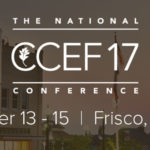 Ed Welch delivered a message about how our family history speaks to our present and shapes how we view God today. Ed encouraged us to do some self-reflection. Our histories impact us naturally, perhaps without us even knowing it. Our past family life can be seen as a house with a shepherd. What was the nature of your formative house? Did you have a good shepherd or bad shepherd?
Ed Welch delivered a message about how our family history speaks to our present and shapes how we view God today. Ed encouraged us to do some self-reflection. Our histories impact us naturally, perhaps without us even knowing it. Our past family life can be seen as a house with a shepherd. What was the nature of your formative house? Did you have a good shepherd or bad shepherd?
Ed challenged us to think of a representative story that captures a vignette of our family history. For him, it was hearing his parents talk as a child and feeling the safety of his own house. Another vignette was recalling what his 1st grade teacher wrote on his report card, “Master Welch can do no wrong.” What is an iconic story or event for you? Think of a story that captures something of yourself and your home that you were raised in.
Consider the traditions and culture in which you were raised? Did your family share meals together or was that foreign to you? How did your story inform who you are? How did it shape your identity and self-definition? How do the shepherds you have had shape your life now? Did you feel wanted? Loved? Enjoyed? Did you feel secure? What did it communicate about who God is?
The faces of human beings can reflect something about God. How has your past shaped your view of the nearness of God? Do you view God as distant or close? Was your house a house that seemed to be constantly torn down? Or was it an attractive house on the outside, but that was only a facade? How do you carry your story with you?
In the Count of Monte Cristo, the main character lives in a palace but his servant comes into the room finding him on the floor instead of his bed. He was still living as a pauper. As Christians, we often live as orphans but we should aim to leave nothing that is significant untouched by our new shepherd. Our new representative story becomes 1 Corinthians 2:2: “For I decided to know nothing among you except Jesus Christ and him crucified.”
“We move to a new family with a new shepherd. It tells a story that is louder, that dominates.” In this new story, Christ is for you. He is the substitute for you. He desired to be the sacrificial lamb for us. We lean into the one who kept the law as our perfect representative when we never could.
In this new story, Christ is for us. We are in Christ. Sin persists but with a diminished power. We have been called to be in a world of trouble rather than taken out of the world of trouble. Yet we have his presence. He never leaves or forsakes us. Jesus Christ is the suffering servant and we follow in that road.
What is the culture in this new kingdom? When we go to the dinner table, we find that Jesus specializes in those who are on the outs. “Jesus was committed to gather those on the outskirts. If you are on the outs, it means you are among the people of God.”
What is the culture like? It is a culture where you recognize that God’s inclination is to be closer and closer. God is close, not far. If people stray, he will pursue them. He is a good shepherd! We will be brought into his house and table to experience his divine hospitality.
“It is important to remember that in this new house not all things go well. We are on a royal road that moves through a wilderness. We move through the wilderness with confidence because God is with us.” It means that there are many things I don’t understand that my father does. I don’t need to understand these things. I know enough about my father and I trust him.
In this new house, God tells us, “I will be the one to rescue you.” (Ezekiel 34:10.) Jesus says to you, “Mine.” In the new kingdom, God calls you his very own and says to you that his house is yours.
“Fear not, little flock, for it is your Father’s good pleasure to give you the kingdom.” – Luke 12:32
Until heaven and earth fully meet in Christ, we contribute to this new house. The Lord grants to us this strange privilege of partnering with him when he is the one who ultimately does all the work. Faith is seeing increasingly clearly through our story and seeing the bigger story. By faith, the heroes of the faith saw the difficulties of life but they saw beyond it and saw the new house and the new shepherd (Hebrews 11).
May we be ever mindful of our new house and new shepherd and have that as our vantage point for the rest of our lives.
<< View the other CCEF17 main session summaries here. >>






